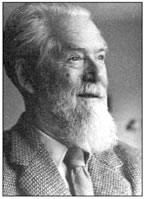John Macmurray
| John Macmurray | |
|---|---|
 |
|
| Born |
16 February 1891 Maxwelltown, Scotland |
| Died | 21 June 1976 (aged 85) Edinburgh, Scotland |
| Website | http://johnmacmurray.org |
John Macmurray MC (16 February 1891 – 21 June 1976) was a Scottish philosopher. His thought moved beyond the modern tradition begun by Descartes and continued in Britain by Locke, Berkeley and Hume. He made contributions in the fields of political science, religion, education, and philosophy in a long career of writing, teaching, and public speaking. After retirement he became a Quaker.
Macmurray was born on 16 February 1891 in Maxwelltown in Kirkcudbrightshire, Scotland, into a strict Presbyterian family. His father was employed by the Inland Revenue Department as an excise officer. In 1899 the family moved to Aberdeen, where the young Macmurray attended Aberdeen Grammar School (1903 to 1905) and Robert Gordon's College (1905 to 1909). He was educated at the University of Glasgow, earning First-class honours in Classics and was awarded a Snell Exhibition to attend Balliol College, Oxford in 1913. His tutor at Balliol was A. D. Lindsay.
When war with Germany was declared in 1914, Macmurray enlisted in the Royal Army Medical Corps. In August 1915 he was sent to France with the 58th Field Ambulance as part of the 19th (Western) Division of the British Expeditionary Force. In June 1916 he was awarded a commission as Second Lieutenant in the Queen's Own Cameron Highlanders and was sent to the Battle of the Somme. Macmurray married Elizabeth Hyde Campbell in London during a three-day leave in October 1916. He was seriously wounded in battle near Arras on 28 March 1918 and was awarded the Military Cross for gallantry.
...
Wikipedia
